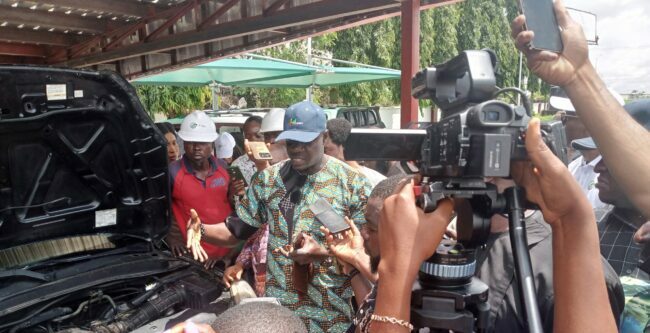The Federal Government has revealed its plan to convert at least one million vehicles to compressed natural gas (CNG) fuel by 2027.
The commercial operations manager of the Presidential Compressed Natural Gas Initiative (PCNGI), Omo Imoukhuede, who disclosed this during a media tour of CNG kit conversion workshops in Abuja, confirmed that more centres would be opened across the country in the coming days.
According to him, the PCNGI was strategic in pushing the CNG initiative through awareness, adding that the initial focus will be on mass transit and commercial transport operators to reduce transportation costs.
“PCNI has been very strategic in everything that we have done in pushing the CNG initiative to ensure that adoption and awareness come to light.
‘We are starting with Abuja, and we will be rolling out in other states across the Federation. Hopefully, as you can see, work is ongoing and the task will be accomplished.
“The first focus is on mass transit and commercial transport operators, as they are key to the government’s target of reducing transportation costs,” Imoukhuede said.
Also addressing the press at the NIPCO Plc CNG Station, Assistant Manager, NIPCO Gas, Sunday Ayoola, said the installation of the conversion kit takes about five hours to complete.
He, however, says that the kit allows the vehicle to run with both petrol and CNG without any hitches, saying it costs about N4,000 to fill the cylinder at N200/standard cubic metre. He said that with a full cylinder, a vehicle could cover an average of 150 km.
Speaking on the safety associated with the CNG, Ayoola said, “In case of impact, nothing happens to this storage because it is 7 mm (millimetre) thick. The cylinder has been designed to withstand impact and temperature.
“People are always apprehensive about natural gas, gasoline, and their volatility. Natural gas is lighter, and once it escapes from the cylinder, it goes up above the air, making sure that there is no spool around, unlike petrol.
“When there is leakage of petrol, it creates a spool within the vehicle, and at any slight source of ignition, the vehicle is ignited. This is not so with natural gas, and because of that basic property, it is safer when compared to petrol,” he stated.
ALSO READ THESE TOP STORIES FROM NIGERIAN TRIBUNE
